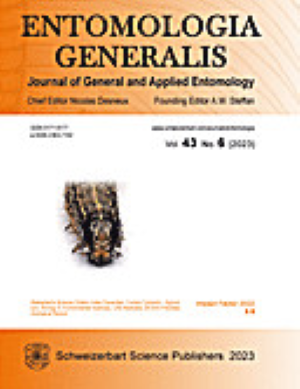Male-specific hexokinase functions as a seminal fluid protein to enhance insect fitness
IF 4.6
1区 农林科学
Q1 ENTOMOLOGY
引用次数: 0
Abstract
A growing body of evidence has highlighted the vital roles of male-specific seminal fluid proteins (SFPs) in animal sexual selection and reproduction. SFPs were proved to function as central mediators of reproductive fitness by interacting with female-derived molecules to modulate pivotal reproductive processes such as sperm competition, female receptivity, ovulation, and oogenesis. However, the underlying mechanisms of SFPs remain unclear. The present study reports on the hexokinase (hk) family of genes, specifically two members (hk1 and hk2), in the Ophraella communa genome. While hk1 was expressed in multiple tissues and did not affect fecundity, hk2 was specifically expressed in male testes and functioned as a novel and conserved SFP to enhance fertility. Furthermore, HK2 activated the expression of an Apolipophorin-like (Ap-like) gene, which is essential for beetle reproduction. The Ap-like gene activated the expression of triacylglycerol lipase (TGL), resulting in a change in the triglyceride content, which consequently affected fertility. These findings highlight a novel role of an animal HK family in SFP function. Moreover, the newly identified HK/Ap-like/TGL pathway provides new insights for future research on the SFP evolution theory.雄性特异性己糖激酶发挥精液蛋白的功能,提高昆虫的适应能力
越来越多的证据凸显了雄性特异性精液蛋白(SFP)在动物性选择和繁殖中的重要作用。通过与雌性衍生分子相互作用来调节精子竞争、雌性接受能力、排卵和卵子生成等关键生殖过程,SFPs 被证明是生殖适宜性的核心介质。然而,SFPs 的内在机制仍不清楚。本研究报告了 Ophraella communa 基因组中的己糖激酶(hk)家族基因,特别是其中的两个成员(hk1 和 hk2)。hk1 在多种组织中表达,不影响繁殖力,而 hk2 则特异性地在雄性睾丸中表达,并作为一种新的保守的 SFP 起着提高繁殖力的作用。此外,HK2 还能激活甲虫繁殖所必需的 Apolipophorin-like(Ap-like)基因的表达。Ap 样基因激活了三酰甘油脂肪酶(TGL)的表达,导致甘油三酯含量发生变化,从而影响了繁殖力。这些发现凸显了动物 HK 家族在 SFP 功能中的新作用。此外,新发现的HK/Ap-like/TGL通路为今后研究SFP进化理论提供了新的见解。
本文章由计算机程序翻译,如有差异,请以英文原文为准。
求助全文
约1分钟内获得全文
求助全文
来源期刊

Entomologia Generalis
生物-昆虫学
CiteScore
7.10
自引率
18.80%
发文量
72
审稿时长
>12 weeks
期刊介绍:
Its scope covers all aspects of basic and applied research dealing with insects and more broadly with arthropods inhabiting wild, agricultural and/or urban habitats. The journal also considers research integrating various disciplines and issues within the broad field of entomology and ecology.
Entomologia Generalis publishes high quality research articles on advances in knowledge on the ecology and biology of arthropods, as well as on their importance for key ecosystems services, e.g. as biological control and pollination. The journal devotes special attention to contributions providing significant advances (i) on the fundamental knowledge and on sustainable control strategies of arthropod pests (including of stored products) and vectors of diseases, (ii) on the biology and ecology of beneficial arthropods, (iii) on the spread and impact of invasive pests, and (iv) on potential side effects of pest management methods.
Entomologia Generalis welcomes review articles on significant developments in the field of entomology. These are usually invited by the editorial board, but proposals may be sent to the Editor-in-Chief for preliminary assessment by the editorial board before formal submission to the journal. The journal also considers comments on papers published in Entomologia Generalis, as well as short notes on topics that are of broader interest.
 求助内容:
求助内容: 应助结果提醒方式:
应助结果提醒方式:


